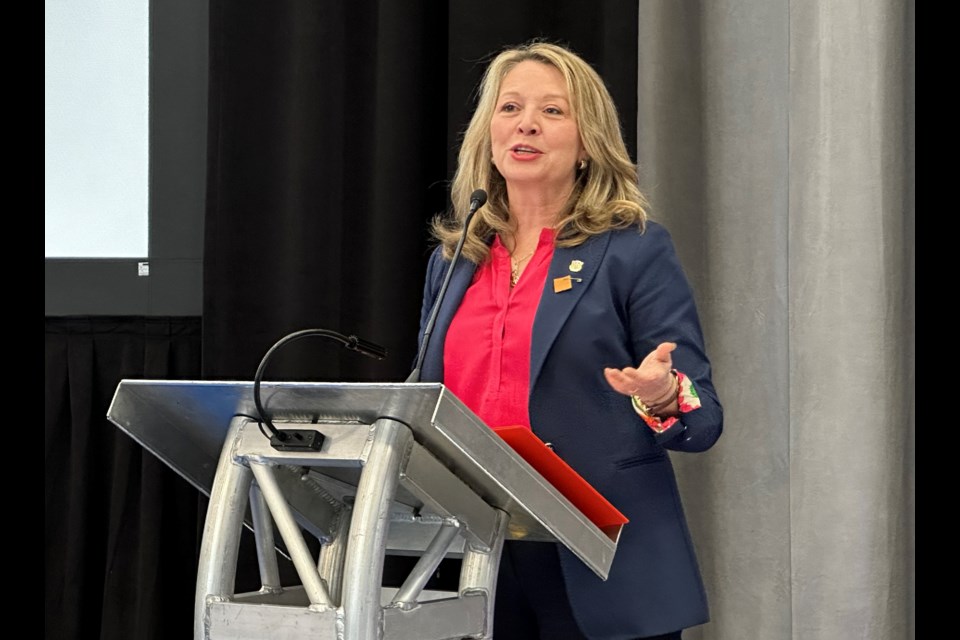Top municipal officials from around the province have come together this week at the Orillia Recreation Centre to discuss pressing issues faced by Ontario’s towns and cities.
Orillia is the host of the three-day Ontario Small Urban Municipalities (OSUM) conference, welcoming more than 150 municipal and provincial officials to share ideas and solutions about common issues Ontario’s smaller municipalities face.
Various speakers will address housing, homelessness, political polarization, the state of local media, and many other topics over the course of the conference, which Orillia Mayor Don McIsaac said will provide a "great opportunity" for officials to learn more about how different municipalities are addressing issues they face.
“We all have common problems, and I like to see how others solve them,” said McIsaac. “We've got rapid rehousing — that's one of the solutions we have … other people have experience solving doctor shortages and other things.”
He said the event is important.
“Those are all things that we can learn and benefit from the experience of others,” he said. “It gets people together. We get to know each other by building a relationship.”
Among other topics, the climbing costs of delivering municipal services was discussed in detail Thursday morning.
“As a result of downloading in the 1990s, almost one-third of annual municipal spending in Ontario pays for services that, everywhere else in the country, are a provincial responsibility,” said Lindsay Jones, director of policy and government relations with the Association of Municipalities of Ontario.
“This includes social housing, emergency shelters, long-term care, public health, land ambulance, child care, and social services, and while the province provides grants to cover these services, they don't come close to covering the actual costs.”
Jones noted that while municipalities have stepped up to address deepening social and economic issues, they are “not built for the kind of income redistribution that we’re being asked to take on, resulting in growing unmet needs that are undermining Ontario’s economic and social prosperity."
Regarding social issues, she pointed to the roughly 1,400 homeless encampments across Ontario, which have proliferated in spite of a 200 per cent increase in municipal spending in the past five years.
“Seniors on fixed incomes and struggling small businesses simply can't afford to underwrite the investments needed to solve these problems,” Jones said. “Our system was never designed to work this way. The result that we see in our communities is unmet need with growing social and economic consequences.”
These growing issues are something Marit Stiles, the leader of the Ontario NDP, said she hopes to help solve if elected in 2026.
“Under my leadership as Premier of Ontario, municipalities will have a seat at the table, and that means working together in collaboration to build a new deal for every single town and every single city,” the official opposition leader told officials Thursday morning. “People in our communities cannot afford to wait any longer.”
Stiles said her party is committed to making municipalities “whole” for revenue losses incurred through the Ontario Conservative Party’s Bill 23, the More Homes Built Faster Act, and she said the NDP are willing to spend more to help address the housing crisis.
“Our plan is to offer grants, low cost financing, public land and other resources to public, nonprofit and co-op housing providers,” she said. “We are not afraid of spending on housing. We think it's a priority, and we're going to get it done.”
Mike Schreiner, leader of the Green Party of Ontario, also spoke Thursday afternoon, with the Ontario Liberal Party Leader, Bonnie Crombie, slated to address delegates tomorrow morning.
Paul Calandra, Minister of Municipal Affairs and Housing, is set to speak Friday morning, as well.
According to a press release issued by the City of Orillia, it is estimated the OSUM conference will generate an $80,000 economic impact for the community.



